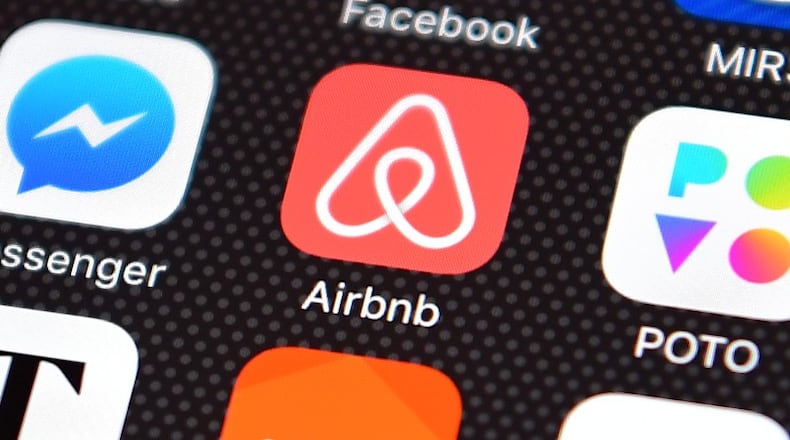Johana Miller wanted to find a way to support her family without having to depend on a 9-to-5 job, and came up with an unusual idea.
She proposed to her husband, Chris, that they and their three daughters move into the one-bedroom unit in the basement of their Collier Heights home and list the two-story, four-bedroom house for short-term rental on Airbnb.
“It’s very untraditional. I had to convince my husband to do it,” said Miller, who is a part-time Spanish schoolteacher while Chris works on starting a nonprofit to mentor at-risk youths.
Johana, Chris and the girls now live in the 1,000-square-foot basement space. The rental income supports the family.
“Our life depends on it, in a sense.... This feeds our family,” Miller said.
The Millers are among many short-term rental owners who could see income affected by a looming fight in Atlanta City Hall. The city council is considering a ban or restrictive controls on short-term rentals.
The ban is championed by homeowners worried about rental homes near them being used for loud parties, and concerned about neighborhoods turning into hotel districts and the loss of neighborly community.
Fighting against it are property rights activists and vacation-rental website giant Airbnb.
“It’s a multi-billion dollar industry.... They’re very experienced and skilled with thrusting and parrying,” said Atlanta City Council member Howard Shook, who proposed the ban.
Then there are those caught in-between — people like the Millers who rely on short-term rentals of rooms or homes to survive the pandemic, make ends meet or build wealth and assets.
“I don’t come from a family of wealth,” said Miller, who immigrated from Panama. “Wealth is just something that we’re trying to figure out.”
She said a ban would affect her plans to buy a second property. A ban could force her to shift her home to long-term instead of short-term rental.
“We’ve definitely kept that in mind. We’ve chosen a property that would be rentable,” she said. But, short-term rentals are more profitable, she said. She fears the minority of rental owners who are irresponsible hosts are about to take down entrepreneurs that are providing services that many in the city see as helpful and necessary.
Some “party houses” rented out on Airbnb have played host to criminal activity including homicides and shootings, prompting consternation among neighbors in Buckhead and other areas. The city council has already passed an ordinance to ban party houses. But some say they are still worried about the commercialization of neighborhoods by Airbnb and other platforms like Vrbo and HomeAway.
“It’s been a problem,” said Gordon Certain, the past president of the North Buckhead Civic Association. He doesn’t want short-term rentals in his neighborhood. “This is not a hotel district,” he said.
Others take a more moderate stand. Short term rentals are important to the tourism and film industry. They provide visiting families or those getting homes renovated places to stay.
“I think short-term rentals have an important role in the community,” said city council member Matt Westmoreland.
Westmoreland said some residents rely on the stream of income from short-term rentals to pay mortgages or property taxes.
He and council member Andre Dickens are proposing a certificate and 8% tax on short-term rentals instead of a ban.
Owners like the Millers and Sylvia Jackson already took one financial punch in 2020.
Jackson, who works in the film industry, is an Airbnb host in partnership with her father. They have a house in Atlanta and two units in Savannah. When the pandemic hit, filming came to a halt, taking much of her income with it.
“It was super scary in the beginning, because we had no work,” Jackson said. “But luckily we were able to focus on the Airbnbs.”
The rental business has started to bounce back with longer bookings by people in town to do construction jobs, locals who need extra space and others looking for a change in scenery or a work location outside of their home.
“We’re people who are supplementing our income,” Jackson said. She supports limited regulation in Atlanta, “because we have that in Savannah, and it works out wonderfully.”
Savannah allows short-term rentals in certain districts, but requires an application process and certificate, and it limits rentals to 20% of residences in certain areas.
Shook said, “I’m not trying to ruin anyone’s life who counts on this supplemental income by renting out their home.”
But, he added, even responsible renters can prompt concerns from residents.
“More and more you’re seeing the neighbors say, ‘I’m getting tired of living next to somebody where I never know who’s supposed to be there and who isn’t, and who’s coming and who’s going. I’m supposed to know my neighbors, and we’re all supposed to be part of the community,’” Shook said.
Jeff Elrod, who lives in the Cascade Avenue area and has attended neighborhood planning unit discussions on short-term rental regulations, said he and his wife stay at Airbnbs, and they haven’t experienced problems with Airbnb properties on their street.
He has older neighbors on fixed incomes, and said there is some concern about restricting people’s ability to bring in an extra money if they need it.
Elrod is more concerned about vacant houses and lots in his neighborhood that violate city code.
“I’d much rather live next to an Airbnb with people coming and going from it than a pit or a vacant house that’s dangerous,” he said.
The city’s neighborhood planning units are considering and commenting on the proposals. City council members will receive the input in early 2021 before working further on the proposed regulations.
About the Author
The Latest
Featured




